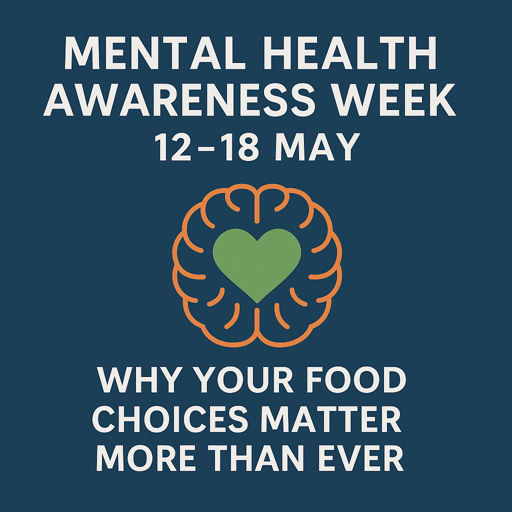12–18 May | Blue Zone Nutrition
This week marks the beginning of Mental Health Awareness Week, a powerful opportunity to start important conversations about our emotional wellbeing—and to take action. In the UK, one in four people will experience a mental health issue in any given year. While causes are often complex, there is one powerful, often-overlooked factor that influences how we feel every single day: what we eat.
At Blue Zone Nutrition, we draw inspiration from the world’s healthiest populations—places known as the Blue Zones—where people live longer, more fulfilling lives with lower rates of depression, anxiety and cognitive decline. These communities include Okinawa (Japan), Sardinia (Italy), Ikaria (Greece), Nicoya (Costa Rica), and Loma Linda (California). Nutrition, lifestyle, and purpose are at the heart of their wellbeing.
So, as we begin Mental Health Awareness Week (12–18 May), here’s how your food can become your first line of defence—and support a healthier, happier mind.
How Food Impacts Mental Health
Our gut and brain are in constant communication through the gut-brain axis. This connection means that what you eat doesn’t just impact your digestion—it influences your mood, memory, stress response, and emotional resilience.
Recent research shows that diets high in ultra-processed foods, refined sugar, and artificial additives are strongly linked to depression and anxiety. In contrast, diets rich in whole, organic, anti-inflammatory foods can support neurotransmitter production, balance blood sugar, and reduce chronic stress and inflammation—key contributors to poor mental health.
What We Can Learn from the Blue Zones
In the Blue Zones, food is fresh, organic, locally grown, and naturally anti-inflammatory. Meals are simple, social, and plant-forward. There’s an abundance of fibre, healthy fats, antioxidants and probiotics—all essential for a healthy mind.
Here’s what you can apply to your daily life:
Eat more plants – Focus on leafy greens, colourful veg, legumes and seasonal fruit
Choose whole over refined – Whole grains, nuts, seeds and pulses provide fibre and stabilise energy
Cut the sugar – Avoid hidden sugars and sweeteners that trigger inflammation and mood swings
Go organic when possible – Reduce your exposure to pesticides and chemicals that disrupt gut and hormonal health
Use healing herbs and spices – Turmeric, ginger, rosemary and basil support brain health and digestion
The Role of Inflammation in Mental Health
Chronic inflammation is now recognised as a key player in the development of depression, fatigue, brain fog and anxiety. Processed foods, alcohol, trans fats, and stress all fuel inflammation. An anti-inflammatory, nutrient-dense diet helps to regulate the immune system and protect the brain from damage and oxidative stress.
By adopting an anti-inflammatory lifestyle, many of my clients at Blue Zone Nutrition have experienced improved mood, deeper sleep, better focus and reduced anxiety.
Mental Health Is More Than Diet—But Diet Is the Foundation
Mental wellbeing isn’t only about food. Purpose, movement, sleep, social connection and emotional expression all matter. But food provides the foundation. When your body is nourished, your brain has what it needs to function clearly and calmly.
This Mental Health Awareness Week, ask yourself:
How is my diet affecting my energy, mood and focus?
Am I giving my brain the nutrients it needs to thrive?
Could I feel better with the right support?
Take Action Today
If you’re struggling with low mood, brain fog, or chronic stress, you don’t have to go it alone. Small, consistent changes can have a profound effect on how you feel—and it all starts with your plate.
At Blue Zone Nutrition, I offer personalised nutritional therapy rooted in science and inspired by the world’s longest-living communities.
Ready to support your mind from the inside out?
Book your free 15-minute consultation
Written by
Milvia Pili (FNTP)
Registered Nutritional Therapist
Founder, Blue Zone Nutrition
www.bluezonenutrition.co.uk




